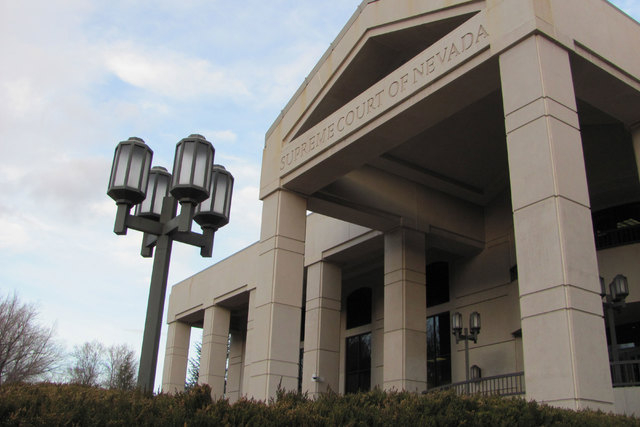Debate on Nevada’s version of Adam Walsh Act goes to state’s high court
An injunction against Nevada’s version of the Adam Walsh Act, a sex offender registration plan passed in 2007 but never enacted, was debated before the Nevada Supreme Court on Tuesday morning.
Assembly Bill 579 has been mired in litigation since it was signed into law, with prior constitutional challenges at the Nevada Supreme Court and the 9th U.S. Circuit Court of Appeals. A court order barring the state from enacting the law was dissolved in district court in Dec. 2013 and that was appealed to the state’s high court.
Previous hearings on the injunction were postponed to give the Legislature a chance to address concerns about the law.
Las Vegas attorney Robert Langford, on behalf of plaintiff M.W., argued that the state’s high court must reverse the ruling to dissolve the injunction, because the law violates the Nevada constitution. Senior Deputy Attorney General Kimberly Buchanan countered that previous cases have already ruled against Langford’s complaints.
The case is centered on a man, identified only as M.W., who was convicted of attempted incest in Colorado in 1996, when he was 21 years old. Before moving to Nevada, the man was registered as a low-risk sex offender and was not required to notify the community or appear on an online registry.
Langford told the full panel of justices that the injunction was required because his client had a likelihood of success based on the merits of the case, and that allowing the law to go into effect would do irreparable harm to him. Langford’s opening brief asserted that the Adam Walsh Act violated the state constitution in several ways.
While the justices expressed skepticism about Langford’s constitutional arguments, they also appeared open to giving the case a more thorough vetting in district court.
Justices Christina Pickering and Michael Cherry asked how there could be problems with the separation of powers doctrine and the contracts clause, considering the man was convicted in Colorado.
Langford said the state’s judicial powers were still being subverted by the executive branch because the department of public safety was going to overrule a court’s decision about the tier and length of time for which M.W. had to register as a sex offender.
“One could still argue that even though his judicial determination was outside of Nevada, there still was a judicial determination,” he said.
Buchanan refuted Langford’s argument that previous opinions on the law didn’t apply to this case, saying that the issues had all been resolved. The 9th Circuit decided in 2012 that the law could be applied retroactively, and the Nevada Supreme Court said in 2013 that the law could be applied to juveniles.
The state won when it had a much higher burden of proof in the juvenile context, she said.
Buchanan said the Adam Walsh Act registration plan, which would force M.W. to register and appear on public registries for life if enacted, was not a punishment.
The man, who was supposed to have completed his obligation to register by about 2008, may face challenges finding employment and housing if subjected to community notification, according to his lawyers.
But types of public shaming are “collateral consequences” and not an intended punishment. And there’s no need to remand the case for trial, because there are not any additional facts to produce during discovery, Buchanan said.
It’s a “broad constitutional challenge” on its face and not as enacted, she said, adding that no one has actually been harmed by the law.
Justices said the issue of irreparable harm might need to be explored further. Someone could recognize him from an online registry and follow him to a meeting “like they did in South Carolina” and attack.
“Why shouldn’t we return this to the district court for a thorough vetting for constitutional problems?” Pickering said.
The court recognized problems with the Adam Walsh Act in the 2013 case, noting that the bill seemed to have been rushed through a Legislature afraid of losing federal grant funding. This year, Senate Bill 99 addressed critics’ problems with how sex offender laws applied to juveniles, but Gov. Brian Sandoval vetoed the measure.
“Some of the issues here may be something that the trial court needs to know about,” Chief Justice James Hardesty said.
Contact Wesley Juhl at wjuhl@reviewjournal.com and 702-383-0391. Find him on Twitter: @WesJuhl.




























